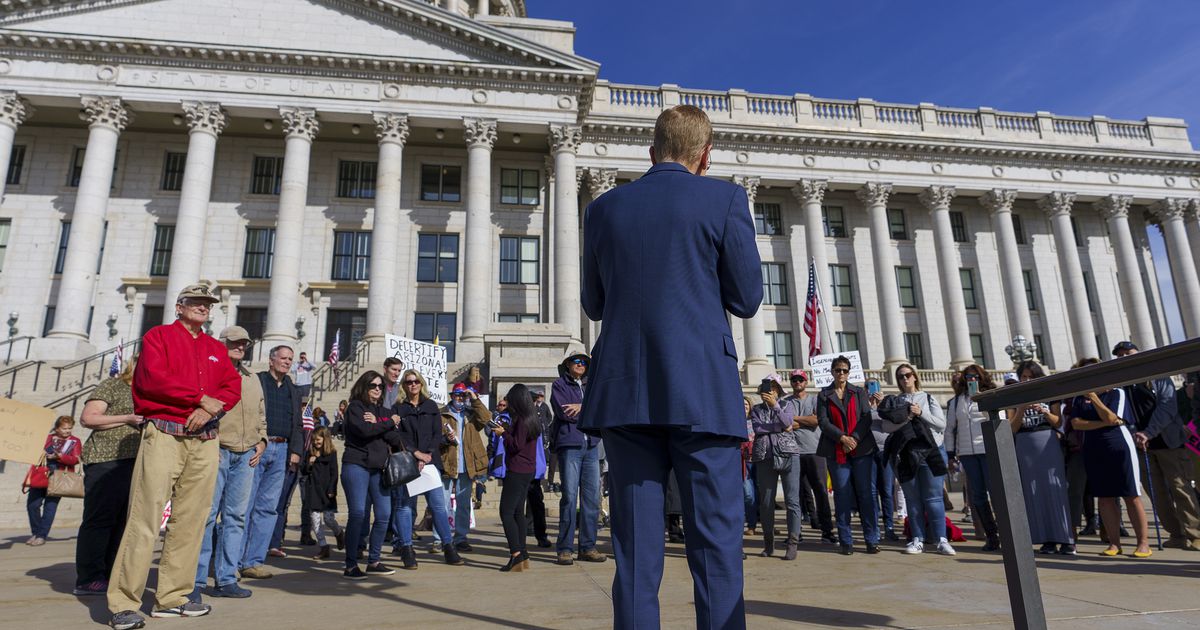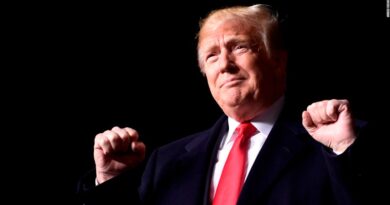Calls to audit Utah’s 2020 election fall flat as legislative committee takes no action

Editor’s note • This story is available to Salt Lake Tribune subscribers only. Thank you for supporting local journalism.
A much-hyped hearing on “election integrity” mostly fizzled out on Wednesday afternoon, as Utahns who want lawmakers to approve an audit of the 2020 election in Utah packed a hearing room in the Utah State Capitol, but walked away wanting.
Any hopes of an audit springing from the hearing were dashed early as Rep. Karianne Lisonbee, R-Layton, the House chair of the committee, threw cold water on the idea.
“We cannot call for an audit. We’re here to discuss safe and secure elections and legislative ideas for that,” Lisonbee said.
She added there were several lawmakers who are currently working on legislation to authorize an audit. The reality is any legislative solution will likely have to wait until the general session which begins in January, unless the issue is added to the agenda for the upcoming November special session for redistricting.
(Leah Hogsten | The Salt Lake Tribune) Activists pushing for a forensic audit of the 2020 election in Utah, rally at the Capitol on Oct. 20, 2021, prior to the 1pm Judiciary Interim Committee’s meeting on election integrity, to Òhear presentations on perspectives regarding election integrity” according to the agenda.
Ahead of the hearing, a small crowd of about 200 people, some with flags or homemade signs calling for an audit, gathered on the steps of the Capitol. Attendees chatted among themselves and traded conspiracy theories about election fraud.
Rep. Steve Christiansen, R-South Jordan, has been the most outspoken in calling for an audit for the 2020 election. In June, he visited the controversial audit in Maricopa County, Arizona. Later in the summer he and Rep. Phil Lyman, R-Blanding, attended the conspiracy-fueled election symposium put on by My Pillow CEO Mike Lindell.
As The Tribune first reported, Christiansen asked the Legislative Audit Subcommittee to conduct an audit of the 2020 election in December of last year. The committee, which is made up of legislative leadership, ignored that request. Christiansen said Wednesday he has asked again.
Why is an audit of the 2020 election needed in Utah? Christiansen made vague references to “anomalies” in Utah’s election results.
“I believe there was fraud in the 2020 election. I can’t prove it, which is why we need to have an audit,” Christiansen said.
Both Christiansen and Lyman have attempted to obtain copies of the entire Utah voter database from the elections office, including the personal information of thousands of Utah voters. That includes names, addresses, phone numbers, and email addresses. The requests also asked for the data for thousands of Utah voters who opted to keep his or her personal information from being released publicly, which was a change approved by lawmakers in 2018.
The request was made using Christiansen’s legislative letterhead.
A copy of Christiansen’s request shared with The Salt Lake Tribune shows he asked for a copy of the entire Utah voter database, as well as information on whether registered voters cast a ballot in the 2020 presidential primary, the 2020 Utah primary election and the general election in November. Christiansen also asked for the data on what method voters used to cast a ballot in those three elections.
Christiansen said several times on Wednesday that his request was denied by the elections office, suggesting the data was being withheld from him illegally, but he refused to elaborate.
In his request, Christiansen cited a state law that gives access to that private voter data to government officials or employees who are acting in an official capacity. But, he said the purpose of his request was “to analyze for political purposes.” A state official cannot mix their official duties with political activities, which is the reason why his request was denied, a fact Christiansen conveniently omitted from his answers.
Members of the committee patiently sat through more than an hour of public comment on the topic, much of it focused on distrust of election results and calls for an independent audit. Some commenters referenced conspiracy theories about election results being altered by outside entities including the Chinese Communist Party.
In the end, the committee took no action on any audit-related issues. When it became clear the event would not lead to the conclusion they were hoping for, Christiansen and Lyman quickly left.
Wednesday’s hearing on elections wasn’t completely focused on auditing Utah’s results.
Lt. Gov. Deidre Henderson, along with Weber County Clerk Ricky Hatch, suggested several ways to improve the security of Utah’s elections, including regular audits of the voter registration rolls, spot checks during ballot processing and implementing other safeguards to protect elections. Those proposals likely will make their way into several proposed bills during the 2020 session.


